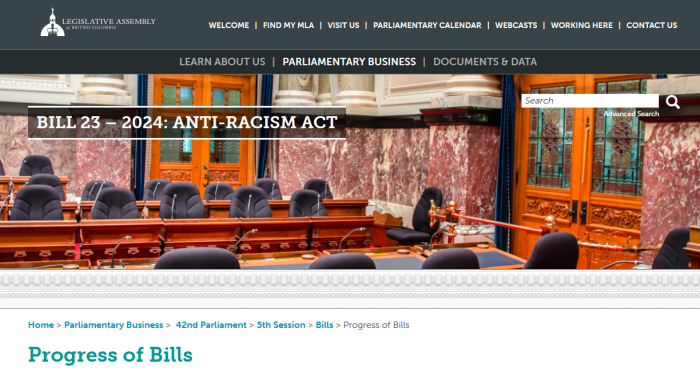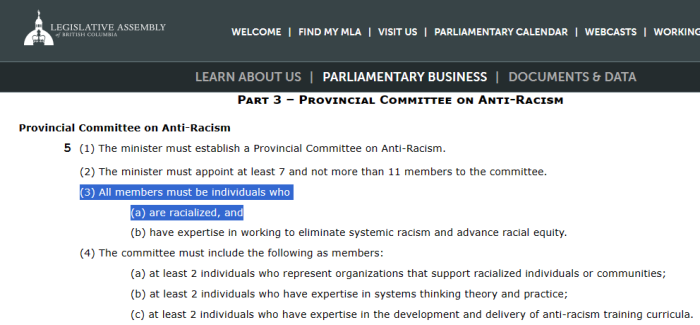
A few days ago, Bill 23 was introduced in the British Columbia Legislature. This is the so-called “Anti-Racism Act”, and it’s every bit as bad as can be expected.
It was introduced by Josie Osborne, who is the Minister of Energy, Mines and Low Carbon Innovation. It’s unclear why she would be doing this, as it appears to have nothing to do with her portfolio.
What are the goals of this Act?
2 This Act must be administered and interpreted in accordance with the following principles:
.
(a) systemic racism, systemic racism specific to Indigenous peoples and racial inequity are harming individuals and communities in British Columbia and require urgent action;
.
(b) actions to identify and eliminate systemic racism and systemic racism specific to Indigenous peoples, and advance racial equity, in programs, services, policies and laws should be informed by data;
.
(c) in taking action to identify and eliminate systemic racism and advance racial equity, consideration must be given to the ways in which an individual’s intersecting identities, including, without limitation, gender identity or expression, sexual orientation, sex or religion, or an individual’s physical or mental disability, result in unique experiences of, or an increased risk of experiencing, systemic racism and racial inequity;
.
(d) consultation and cooperation with Indigenous peoples, acknowledging the rights, interests, priorities and concerns that are specific to First Nations peoples, Métis peoples and Inuit peoples, based on distinctions among them, is essential to the identification and elimination of systemic racism specific to Indigenous peoples and the advancement of racial equity and the implementation of this Act;
.
(e) engagement with racialized communities in British Columbia is essential to the identification and elimination of systemic racism and the advancement of racial equity and the implementation of this Act;
.
(f) investment in programs and services is needed to support healing for individuals and communities harmed by systemic racism, systemic racism specific to Indigenous peoples and racial inequity.
Even though “racial equity” is listed throughout the Bill’s principles, it isn’t actually defined. Best guess, it’s a push for some sort of affirmative action or quota system.
This sort of practice has long existed in employment and post secondary education. In theory, it could easily extend to other areas.

Section 5 of the Bill gets into the makeup of the Committee that will be reporting back to the Legislature. And it immediately becomes clear who isn’t welcome here.
Provincial Committee on Anti-Racism
5 (1) The minister must establish a Provincial Committee on Anti-Racism.
(2) The minister must appoint at least 7 and not more than 11 members to the committee.
(3) All members must be individuals who
(a) are racialized, and
(b) have expertise in working to eliminate systemic racism and advance racial equity.
(4) The committee must include the following as members:
(a) at least 2 individuals who represent organizations that support racialized individuals or communities;
(b) at least 2 individuals who have expertise in systems thinking theory and practice;
(c) at least 2 individuals who have expertise in the development and delivery of anti-racism training curricula.
Clause 5(3)(a) is very telling. In a Bill that claims to be fighting racism, the official policy is “whites need not apply”. Have to say, that sounds rather…. racist.
Clause 5(4)(b) is another one to wonder about. What are the “systems” that need to be implemented or changed? Will we be heading towards South Africa style apartheid?
It’s hard to tell at this point whether this will largely just result in slush funds being handed out to certain groups, or if it will be much worse.
Like many (or most) pieces of legislation in Canada, the B.C. Anti-Racism Act is backdoored with “regulations”. In practice, it means that major changes can be made without having to go back to the Legislature.
Regulations
31 (1) The Lieutenant Governor in Council may make regulations referred to in section 41 [powers to make regulations] of the Interpretation Act.
(2) Without limiting subsection (1), the Lieutenant Governor in Council may make regulations as follows:
(a) respecting accessible formats for documents published under this Act;
(b) respecting anti-racism assessments and the anti-racism assessment framework developed under section 9 (1) (a) [duties of government] or 15 (1) (a) [duties of committee], including, without limitation, respecting
(i) the form and content of anti-racism assessments, and
(ii) the frequency with which anti-racism assessments must be carried out;
(c) respecting anti-racism training curricula and anti-racism training and the standards, targets and indicators set by the government under section 9 (1) (b) and (c) or by the committee under section 15 (1) (b) and (c);
(d) for the purposes of section 11 (4) (b) [actions against Indigenous-specific systemic racism], establishing requirements in relation to the receipt and use of information referred to in section 11 (3) (e);
(e) for the purposes of section 17 (4) (b) [actions against systemic racism], establishing requirements in relation to the receipt and use of information referred to in section 17 (3) (f);
(f) respecting grants under section 29 [minister may provide grant], including, without limitation,
(i) restricting the purposes, amounts or recipients of those grants, and
(ii) respecting the terms and conditions on which the grants may or must be given.
(3) A regulation under this Act may do one or more of the following:
(a) delegate a matter to a person;
(b) confer a discretion on a person;
(c) establish or define groups or categories of public bodies, persons, things, circumstances or other matters;
(d) make different regulations in relation to different public bodies, persons, things, circumstances or other matters, or for different groups or categories of public bodies, persons, things, circumstances or other matters.
Not only are the terms vague and undefined, but the details will be worked out in secret. Assuming this Bill is passed, then only afterwards will it all come out.
The obvious questions include: What sort of regulations will be coming in the near future? Who will be deciding what regulatory changes happen? Will there be any mechanism to challenge such measures? What kind of “discretion” will be handed out to other people or groups?
Affiliation of Multicultural Societies and Service Agencies of BC
The Immigrant Services Society of BC
In the B.C. Lobbying Registry, a few names get flagged when searching anti-racism. Unsurprisingly, both groups receive large amounts of money from taxpayers.
Considering the NDP has a majority in the Province, the legislation will likely pass. Then again, it’s not like the Liberals are much of an opposition party anyway.
(1) https://bcndpcaucus.ca/mla/josie-osborne/
(2) https://www.leg.bc.ca/
(3) https://www.leg.bc.ca/parliamentary-business/legislation-debates-proceedings/42nd-parliament/5th-session/bills
(4) https://www.leg.bc.ca/parliamentary-business/legislation-debates-proceedings/42nd-parliament/5th-session/bills/progress-of-bills
(5) https://www.lobbyistsregistrar.bc.ca/
(6) https://www.lobbyistsregistrar.bc.ca/app/secure/orl/lrs/do/vwRg?cno=3739®Id=56571325
(7) https://www.lobbyistsregistrar.bc.ca/app/secure/orl/lrs/do/vwRg?cno=4629®Id=56572243

The so called Anti Racism Act should be renamed to reflect the true spirit of the act. Reverse Racism Act is more appropriate.
This is more evidence for my contention that “anti-racist” is just a code term for anti-white.